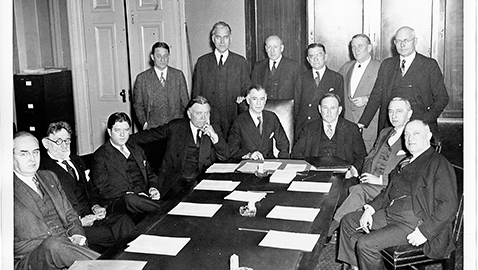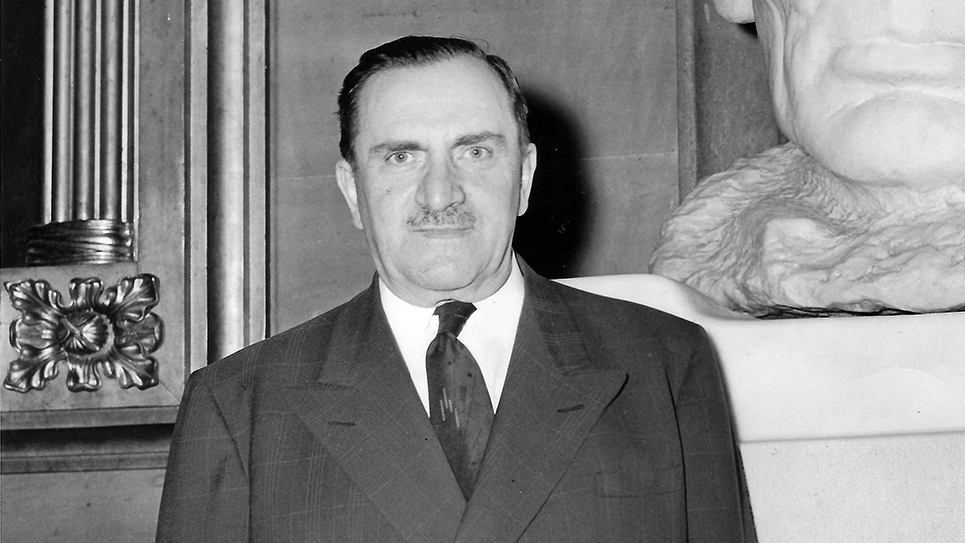By Ray Hill
By 1934, Republicans were not much of a factor in statewide elections in Tennessee. The political landscape in the Volunteer State had changed with the resignation of Senator Cordell Hull, who had agreed to serve as Secretary of State in the administration of President Franklin D. Roosevelt in 1933. It fell to newly elected governor Hill McAlister to appoint a successor to Hull; that successor would serve until 1934 and then run in a special election in 1934.
Governor McAlister appointed former Tennessee State Supreme Court Justice Nathan Lynn Bachman to serve in the United States Senate on February 28, 1933. Bachman had run for the United States Senate in 1924, contesting with incumbent Senator John Knight Shields and businessman Lawrence D. Tyson. Tyson had won the Democratic primary with Bachman running a distant third.
It was an unwritten rule of Tennessee politics that no grand division would occupy both of Tennessee’s Senate seats. Senator Kenneth D. McKellar was from Memphis and Cordell Hull had been from Middle Tennessee. McKellar’s seat would be up for election again in 1934 and Congressman Gordon Browning of Huntingdon was ambitious for a political promotion. For his entire political life, Gordon Browning hungered to serve Tennessee in the United States Senate. While Browning had a long and successful career in Tennessee politics, he would never achieve his ultimate goal of serving in the U. S. Senate.
Browning, a West Tennessean, pondered challenging the formidable McKellar.
Senator McKellar had served three terms in the Senate and while others had been elected to a fourth term, no man had ever served a full fourth term from Tennessee. Browning began making inquiries and sought support in a possible bid to topple McKellar from his Senate seat. Congressman Browning quickly concluded neither he nor anyone else could beat McKellar.
Never one to adhere to convention, Gordon Browning then cast his eyes in Nathan Bachman’s direction. Were he to run against Bachman, an East Tennessean, he might be infringing upon the unwritten rule that no grand division would have both of Tennessee’s senators, but the congressman suspected few voters cared about the rule.
Nathan Lynn Bachman was a kindly soul, one of the best story-tellers in Congress and a favorite of Vice President John Nance Garner, who regularly sought out Senator Bachman’s company. Bachman was married to Pearl Duke, a relation to the late tobacco tycoon James Duke. The Bachmans were wealthy, well established, and the senator was extraordinarily well-liked by those who knew him.
Congressman Gordon Browning calculated not enough people knew Nathan Bachman personally to win a statewide race. While Bachman had been elected to the Tennessee Supreme Court, he had lost his only race for the U. S. Senate. On paper, at least, Nathan L. Bachman appeared to be an inviting political target.
Browning had risen to the rank of Captain in World War I and had made something of a name for himself while in Congress as an advocate for veterans. While that would have mattered little in a race against Senator McKellar, it would likely make a significant difference in a senatorial campaign against Nathan Bachman.
Even though rumors circulated throughout Tennessee and McKellar kept a wary eye on the congressman, few really expected Browning to give up his seat in Congress to run for the Senate. Gordon Browning surprised most everyone when he announced on May 5, 1934 he would run against Senator Nathan L. Bachman for the Democratic nomination.
Described as a “distinct surprise in political circles”, Browning made his announcement from his home in Huntingdon.
“My political faith is that of a Jeffersonian,” Browning declared. “I believe in the common man’s vested rights, in his ability to govern himself, in his right to protection against monopoly, in placing human right above property rights when there is a conflict between the two.”
Congressman Browning, realizing all too well the enormous popularity of President Franklin D. Roosevelt, made his own congressional record clear.
“I have supported loyally the program of recovery and will continue to do so, but no one will insist that the plan at this stage is perfect,” Browning said. “Many rough spots should be ironed out.”
Browning referred specifically to the National Recovery Administration. Browning mentioned continued support for the Tennessee Valley Authority, a requirement for any candidate for statewide office in Tennessee since the creation of the agency in 1933. Browning’s own record on the Tennessee Valley Authority was suspect in the minds of some Tennesseans, not the least of whom was Senator K. D. McKellar. As the House Military Affairs Committee had considered the bill creating the Tennessee Valley Authority, Congressman Browning had appeared, accompanied by one W. G. Waldo, who was a lobbyist for the private power interests. Browning was also absent from the House of Representatives when the TVA Bill was considered, although House Majority Leader Joseph W. Byrns of Nashville had carefully explained his colleague was away on “official business”.
McKellar privately believed Browning was no friend to the Tennessee Valley Authority and was in league with the private power interests to cripple, if not kill the agency.
The forty-five year old Browning was a colorful and entertaining speaker and would have the full support of Tennessee’s veterans as he entered the senatorial race. McKellar, having anticipated a Browning bid against him, stood ready to help his junior colleague win reelection.
Few politicians knew Tennessee as did K. D. McKellar. McKellar had been in the United States Senate since 1917 and had demonstrated remarkable political skills in defeating two better known opponents in the Democratic primary. McKellar was the only candidate to have to run two primary campaigns in order to win the Democratic nomination. Incumbent Senator Luke Lea was highly unpopular with many Tennessee Democrats and a special primary election was called in 1915, a full year before the general election.
McKellar faced Senator Lea and former governor Malcolm Patterson. Like Luke Lea, “Ham” Patterson was a polarizing figure with many Democrats, but McKellar was given little hope of winning the senatorial contest. McKellar came out on top in the first primary, with Senator Lea running third. McKellar then defeated Patterson in the run-off election a month later.
Congressman McKellar faced a serious GOP opponent in the person of Ben W. Hooper, a former two-term governor. McKellar defeated Hooper decisively.
McKellar knew literally thousands of people across Tennessee personally. The McKellar office was acknowledged to be one of the most efficient on Capitol Hill. McKellar religiously answered his mail the same day it arrived and went to extraordinary lengths to help Tennessee and Tennesseans. The senator was highly respected in Tennessee and his firm control of federal patronage in Tennessee made thousands more beholden to him.
Senator McKellar’s support of Nathan Bachman would make a decisive difference in the senatorial contest and it was not long before Gordon Browning was complaining that Bachman’s campaign was being run out of McKellar’s Senate office.
One of the more able campaigner’s in Tennessee’s history, Gordon Browning, while speaking in McKenzie, Tennessee, excoriated Senator Bachman’s record when he open his campaign on June 9.
Browning told his audience it was just a few miles away from where “as a youth I once followed a plow and dreamed of the day when I might stand among my people and ask for the highest legislative office they have the power to bestow.”
Congressman Browning tried hard to contrast his own energetic service in the House of Representative against Bachman’s own record in the Senate. Browning attempted to paint Bachman as a do nothing senator, who was content to merely follow McKellar’s lead.
During his fifteen months of service in the United States Senate, Bachman had “been on his feet” only six times, according to Congressman Browning. Browning sarcastically noted those six occasions when Nathan Bachman rose in the U. S. Senate were for procedural matters; once to suggest the absence of a quorum and five times to request unanimous consent.
“The indications are that he will have nothing to do with anything controversial,” Browning snorted.
It would become the theme of Browning’s drive for the Democratic nomination for the United States Senate. According to Browning, Nathan L. Bachman was a do-nothing senator, merely another vote for McKellar.
Traveling to East Tennessee where Bachman was thought to be strong, Gordon Browning was careful to praise the highly popular President Roosevelt, while lambasting Senator Bachman.
Realizing his vulnerability on the TVA issue, Browning hailed the agency as “one of the greatest achievements ever brought to East Tennessee.”
“It is my hope that within a short time every home in the distributing area will be provided with the cheaper rate,” he added.
Another theme of the Browning senatorial campaign was the candidate’s strong support for Tennessee farmers. Having represented a largely rural and agricultural district in Congress, Browning was a strong supporter of farmers. Congressman Browning said it was the farmers who had suffered the most throughout the Great Depression and only through the success of farmers could the entire country reach a real recovery.
Senator Bachman was in East Tennessee at the same time Browning was flaying him from the courthouse steps in Blountville. Much of the McKellar organization had dutifully lined up behind Senator Bachman’s candidacy and when he spoke in Kingsport, he was introduced to the audience by Judge Guy Chase, a faithful McKellar retainer.
Bachman stressed his own steadfast support for President Roosevelt and the New Deal program. The senator described FDR as “incomparable”, an opinion shared by the great majority of Tennesseans.
Senator Bachman noted he had voted for the legislation creating the Tennessee Valley Authority while Browning was away “trying to impeach a California governor.”
In contrast to Browning’s charges that Bachman was a do-nothing senator, Bachman pointed out during the last forty-eight days Congress was in session, he was hard at work in the Senate while Browning was back home in Tennessee plotting his campaign.
Browning had attempted to infer Bachman was close to the Duke private power interests, an accusation the senator dismissed as not only groundless, but absolutely untrue.
In the sweltering heat of early July, Senator Bachman was touring Browning’s home base of West Tennessee. The senator kept a full schedule, visiting Dickson, Waverly, Camden and Paris while Browning was campaigning in Lynchburg and Tullahoma in a single day.
Senator Bachman moved through cities and towns at an astonishing pace and even the energetic pace set by Congressman Browning paled in comparison. As Nathan Bachman visited Brownsville, Alamo, Bells, Humboldt and Trenton in Gordon Browning’s Seventh Congressional district, Browning was campaigning in Kingston and Harriman.
Bachman devoted an entire day to campaigning in Browning’s native Carroll County and Jackson. The congressman spent the same day in Middle Tennessee, campaigning in Carthage, Cookeville and Lebanon.
Ten years older than Gordon Browning, Nathan Bachman kept a tireless schedule for a supposedly lazy man.







